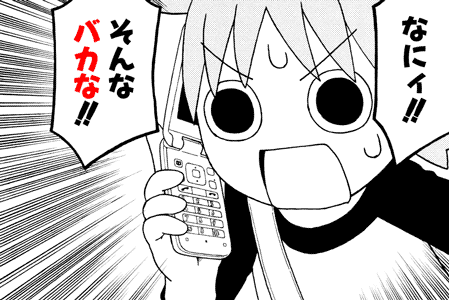In Japanese, baka na バカな means something is "stupid."
But, often, b-b-b-bakana!!! translates to English as "impossible!!!" or "it can't be!!!" and it's typically used by villains when the protagonist does something extremely absurd that ruins all their plans.
Bakana! How can this be?! From the translation, the word bakana has literally nothing to do with "stupid." It means "impossible," for kamisama's sake! So what's going on here?
Meaning
The phrase baka na バカな means something "is stupid" because it's composed of two parts:
- baka
バカ (also spelled 馬鹿.)
Stupid.
Idiot. - na な, attributive copula.
This is the "attributive form," rentaikei 連体形 of the da だ predicative copula, which would be shuushikei 終止形 instead.
This na な attributive copula replaces da だ when it comes before a noun, in a relative clause. Observe:
- kono hito wa baka da
この人はバカだ
This person is stupid. - {baka na} hito
バカな人
A person [that] {is stupid}.
A stupid person. - {baka na} oniisan
バカなお兄さん
[My] older brother [who] {is stupid}.
[My] stupid older brother. - {baka na} imouto
バカな妹
[My] younger sister [who] {is stupid}.
[My] stupid younger sister. - {baka na} watashi
バカな私
Me, [who] {is stupid}.
Stupid me.
The attributive form always comes before a noun, this means that the bakana!!! we hear in anime should come before something else, but it never does, so clearly it's a different thing, right?
Well, actually, no. It's the same thing. Except that what comes after bakana is cut short, left unsaid, so it sounds the grammar is different, when it's actually not.
What's cut short is probably this:
- baka na koto!
バカなこと!
Stupid thing! Stupid idea! Stupid action [you've taken]!
Foolish!
Non-sense!
Another part that's cut short is a demonstrative sonna そんな, "like that," before baka.
- sonna {baka na} koto!
そんなバカなこと!
Something [that] {is stupid} like that!
Something stupid like that!
Something that stupid!
We can already picture what's probably being said:
- sonna {baka na} koto aru wake ga nai!
そんなバカなことあるわけがない!
Something that stupid can't possibly exist! - sonna {baka na} koto dekiru wake ga nai!!
そんなバカなことできるわけがない!!
Something that stupid can't possibly be done!! - sonna {baka na} koto okoru hazu ga nai!!!
そんなバカなこと起こるはずがない!!!
Something that stupid would never happen!!!
Or something like that. You can replace stupid by absurd and then it probably makes more sense:
- There's no way something so absurd could possibly have happened!
- nanii!! sonna baka na!!
なにィ!!そんなバカな!!
Whaat!! [Something] that stupid [can't be]!!
By the way, since baka na! is cut short, it sometimes has a small tsu っ at the end of the phrase. That small tsu is purely phonetic and means nothing.
- baka na!
バカな!
No way!
Impossible!
It can't be! - baka na'!
バカなっ!
Both sentences above mean the same thing.

"The word bakana has literally nothing to do with 'stupid.'" I think that's where my confusion came from. I kept thinking it had to mean something related to stupidity. Thanks for the clarification.
ReplyDeleteNot sure if I should take this seriously, since you combined "Kami" and the honorific "sama" in the same word xP
ReplyDeleteIt should be "Kami-sama"
Maybe because in actual Japanese there are no dashes to separate words, 神様 (かみさま) and not 神-様 (かみ-さま) Hehe!
Deletebakana!
Deleteit is confusing, because not only is there Ba ka na ばかな/バカ な theres also bagana ばがな which mean stupid/fool etc. to be honest though, i never heard a B, i heard an F, so not a Ba sound but a Fa sound, because of how fast the first syllable is, so i thought they were saying fakana, turns out 'fuka na ふかな' means stupid, unless written like this 'fuka na 不可な' where it means impossible. as for the word impossible that can also be '不可能 Fukanō' so more confusing stuff for us english speakers just learning japanese.
ReplyDeletegreat article!
ReplyDeleteThen what is bakara and bakayaro mean?
ReplyDeleteI'm pretty sure the literal translation of that is actually 2 words: Baka and Yaro, Yaro meaning "bastard". So literally "stupid bastard".
Delete